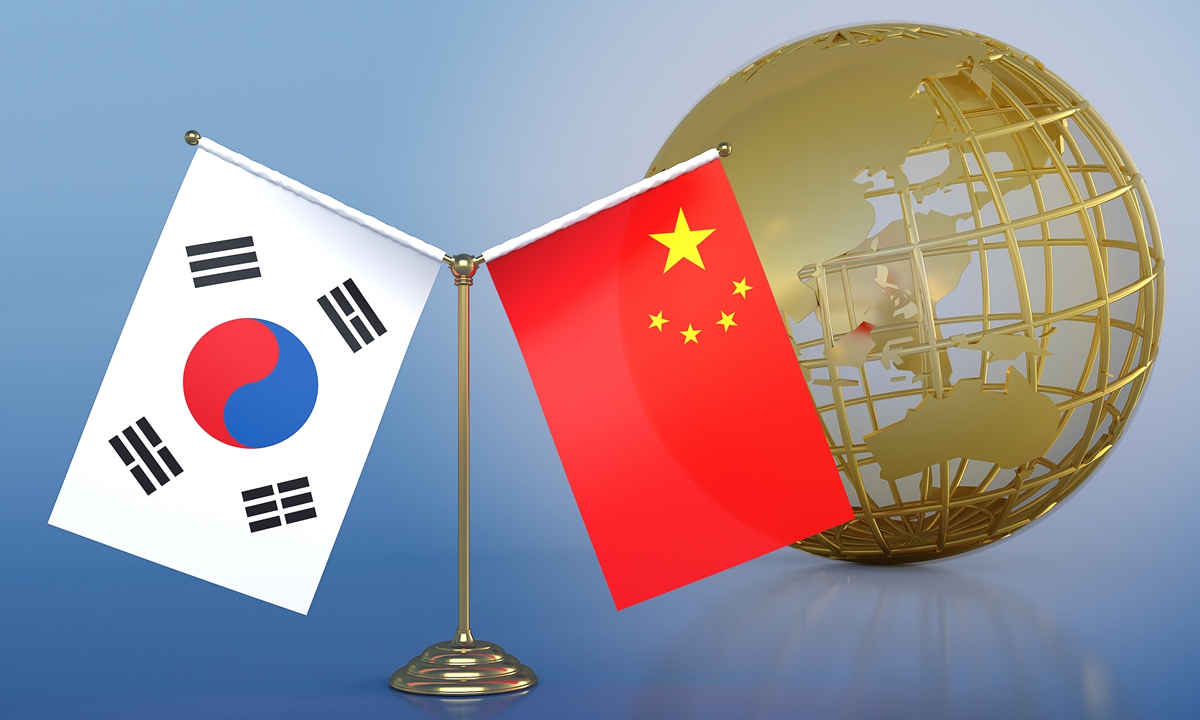
China South Korea Photo:VCG
Chinese President Xi Jinping spoke with South Korean President-elect Yoon Suk-yeol on the phone on Friday afternoon. Xi again congratulated Yoon on his election as president. Yoon congratulated China on the successful two sessions and on the important achievements of national development made under the leadership of President Xi. The two highly affirmed the comprehensive development of China-South Korea ties in the 30 years since the establishment of diplomatic ties, and shared the willingness to push for steady and long-term development, as well as a higher level of China-South Korea relations. The atmosphere of the call was sincere and friendly, which set the main tone for future China-South Korea ties and pointed out the general direction for the deepening of cooperation between the two sides.
This is the first call between Xi and the South Korean president-elect. Quite a few South Korean media outlets described the call as exceptional, which reflects the importance China attaches to China-South Korea ties. This year marks the 30th anniversary of the establishment of diplomatic relations between China and South Korea. South Korea is about to usher in a government change, and the situation in Northeast Asia has become more complicated under the influence of various forces. In this context, timely communication between Xi and Yoon will help maintain continuity and stability in China-South Korea relations, which is of great significance to the two countries, and to the peace and stability of the entire Northeast Asia region.
Yong said, in the past 30 years since the establishment of bilateral diplomatic ties, the two countries have made great achievements in bilateral cooperation in various fields, bringing tangible benefits to people of the two countries. From Yoon's remarks, people find keywords such as "friendliness," "cooperation," and "mutual trust." This is an attitude of meeting China halfway. The first foreign ambassador Yoon met after winning the election was Chinese Ambassador Xing Haiming. The pragmatic, rational and positive signals dissipated concerns that South Korea's future China policy will see a major shift.
The biggest external disturbing factor for China-South Korea ties is from Washington. Yoon takes "strengthening South Korea-US alliance" as the focus of his foreign policy. Meanwhile, the US has been piling pressure on South Korea to take sides, attempting to turn the latter into the US' bridgehead to contain China in Northeast Asia.
China has always respected South Korea's independent foreign policy, but China-South Korea relations shouldn't be an appendix to China-US ties. "Strengthening South Korea-US alliance" should never cause any substantial damage to China's interests, nor should it be at the cost of China-South Korea cooperation in a certain field. Although pressure from the US is increasing, as long as South Korean decision-makers proceed from the overall situation and the fundamental interests of their own people, they should be able to realize that what South Korea needs is a way to get along with all parties based on equality and mutual benefits.
It should also be pointed out that the view - China and South Korea are only closely linked economically - are shallow. The two countries share huge common interests in the security field as well. For South Korea, the biggest security concern is the peace and stability of the peninsula, which is consistent with China's goal of not allowing war and chaos on the peninsula. Facts have proven that in advancing the process of a political settlement of the Korean Peninsula issue and maintaining regional peace and stability, the development of China-South Korea relations conforms to the fundamental interests of the two countries and the two peoples and are favorable to regional peace and development.
The call on Friday offered us a higher standpoint to understand that China and South Korea are permanent close neighbors that cannot move away, and are also inseparable partners. In recent years, there have been fairly fierce disputes between the Chinese and South Korean people on some minor matters, which have affected the relationship between the two countries. However, this is more of an emotional and cognitive problem, not a structural contradiction. China and South Korea have broad consensus and potential for cooperation, as well as common responsibility in maintaining regional peace and promoting world prosperity. The bilateral relationship is worth looking forward to.




